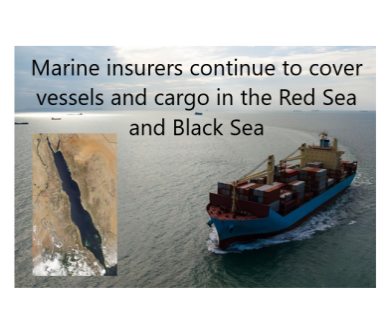Ongoing events affecting global shipping such as those in Ukraine, the Suez Canal & Red Sea, the Panama Canal and piracy off the coast of Africa are resulting not only in surcharges added to freight costs, but also increased marine insurance premiums.
Last month the Global Trade Research Initiative (GTRI) made the assessment that the conflict in and around the Red Sea alone could result in increased shipping costs (40-60%) and delays due to rerouting (up to 20 days more), higher insurance premiums (15-20%), and potential cargo loss from piracy and attacks.
At its annual winter meeting in London, the International Union of Marine Insurance (IUMI), has confirmed that the global marine insurance market is continuing to support trade in the Red Sea and the Ukraine/Black Sea area. Insurers are providing hull and cargo products at affordable prices and vessel owners are able to obtain the cover they require – both for Red Sea/Suez Canal transits or for the longer route around the Cape of Good Hope.
IUMI highlighted the impact of reduced water levels on the Panama Canal, which has led to limitations on vessel draught from 50 feet to 44 feet, subsequently decreasing the number of daily vessel transits. The convergence of these two crises comes in advance of the export surge around the lunar new year shutdowns in Asia. Expected consequences may include a shortage of delivered goods, containers out of position, gridlock at freight handling terminals and congestion at ports.
The term ‘Marine Insurance’ is used when speaking of both insurance of vessels by shipowners, as well as insuring the actual cargo, which is the responsibility of the shipper and consignee.
COVER FOR SHIPPERS AND CONSIGNEES
The global marine insurance premium base reached a total of USD35.8 billion last year. By line of business, cargo continued to command the largest share with 57.3%, followed by hull (23.4%), offshore energy (11.5%) and marine liability (excluding P&I) at 7.7%.
Premiums for cargo insurance reached USD20.5 billion representing an 8.3% uptick on the previous year and continuing the trend for market development in this sector. This was on the back of a post-pandemic rebound in global trade. Loss ratios had returned to more normal levels, had started at their lowest point since 2015.
We always strongly urge our clients to take out marine insurance on their cargo. Aside from the obvious considerations of loss, damage and theft, there are also events whereby the vessel is damaged and the owners declare a ‘general average’ which holds the cargo-owner partly responsible for loss and repairs. Even at increased premiums, marine insurance makes good sense.
SHIPOWNERS
For shipowners, war risk cover for transits of the Red Sea has increased from about 0.01% of vessel value in early December to as much as 1.0% in recent weeks, adding hundreds of thousands of dollars onto the cost of a single voyage. Several vessels have been hit by persistent Houthi missile attacks and have sustained serious damage, like the bulker Zografia and the tanker Marlin Luanda, and many others have experienced near-miss incidents.
IUMI’s report on the global marine insurance market along with discussion and debate on the pressing issues of the day will be featured at its annual conference to be held in Berlin 15-18 September 2024. This year, IUMI celebrates its 150th anniversary which is reflected in the conference common theme “Building on 150 years of enabling global commerce”.
Read this related article from our archives: Timely Reminders re Marine Insurance.
As licensed Customs Brokers and International Freight Forwarders, Colless Young professionally handles all your international transport needs. We provide import and export shipping, as well as airfreight, including customs and quarantine clearance, fumigation treatment, warehousing and trucking. We are based in Brisbane and offer a complete range of logistics services through all Australian ports and airports.

